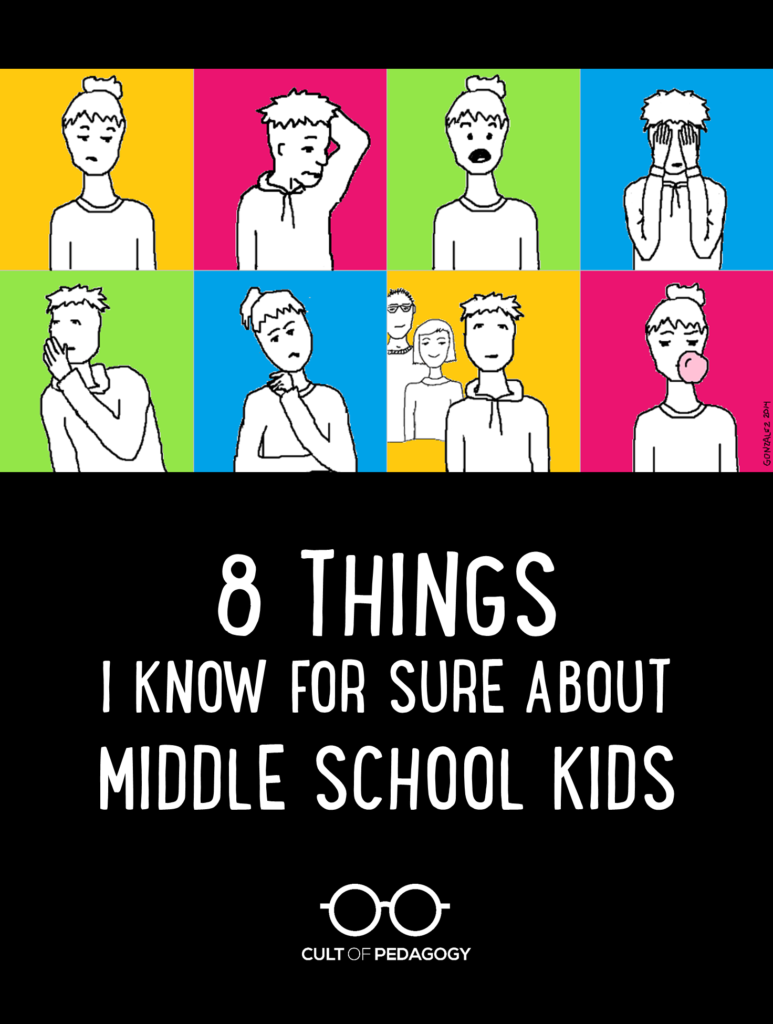8 Things I Know for Sure About (Most) Middle School Kids

Listen to this post as a podcast:
Sponsored by mysimpleshow and Screencast-O-Matic
I never planned to teach middle school.
When I got my teaching degree, I was set on teaching high school English, but the only open position I found was in a middle school. So I took it, planning to move up as soon possible.
Well, I never looked back. Something about that age just got me. And over those years, I became kind of an expert on the idiosyncrasies of sixth, seventh, and eighth graders. I figured out how to make the most of their special qualities. If you recently started teaching middle school, or you have a child this age, you’ve probably discovered these things, too:
1. They care more about the opinions of their peers than pretty much anything else.

This means they will sometimes do things that make no sense, like not turning in an assignment you know they worked hard on, because they just found out they will have to read it out loud in front of the class. Or refusing your offer of a chocolate milk, even though they love chocolate milk, because someone else is around who recently declared all chocolate milk to be babyish.
How to deal with it: See if you can make this quality work for you: Find the most confident kids in class, the ones everyone looks up to, and try to get them to take on a new project or help you lead the charge toward some endeavor you want everyone else on board for. If Josie the cool girl says she likes Shakespeare, others are more likely to follow. Also, know that socializing is a huge motivator for middle school kids. If you promise five minutes of talking time at the end of class in exchange for hard work the rest of the hour, you’re likely to get full cooperation.
2. They are horrified by what their bodies are doing.

For those of us who are well past adolescence, it’s easy to forget what it was like to deal with the constant betrayal that comes with a new body: There you are, going about your regular kid business, when one day your skin explodes with zits. Popping them turns out to make them even more noticeable. Or you’re sitting in third period, quietly suffering through some kid’s serious B.O. Escaping to fourth period, you discover the smell is there, too. After a quick check, you are struck with the devastating realization that the person with B.O. is YOU. Every couple of weeks, some new phenomenon introduces itself into the middle schooler’s physical life, threatening to destroy their social lives until high school graduation.
How to deal with it: Try not to call attention to their bodies; they would prefer that no one point out that their voices are changing, their feet are getting bigger, or worse, that they don’t seem to be growing at all. Also? If you’re trying to get a kid to do something public, like do a problem on the board or pass out a worksheet, and they really resist you? There’s probably a physical explanation, be it a boner, a suspected period leak, or the sudden discovery of a muffin top. If you get inexplicable resistance, back off. Don’t try to figure out the reason. Just move on to another kid. The one you let off the hook will be eternally grateful.
3. They trend toward hyperbole.

You say there’s a spider in the corner of a seventh grade classroom? Get ready for a wall-climbing, horror-movie-screaming, Armageddon-style wig-out. Did it just start snowing outside? Sit back and watch them all act like they never saw snow, complete with squeals and fist-pumps and fist-bumps and the whole gang rushing to the window! Wait — is someone crying in the bathroom at the dance? Observe as ten girls sprint through the gym, tugging each other’s arms, with faces that say this is the most important thing that has ever happened. Ever. Whether it’s due to limited life experience, hormones wreaking havoc on emotions, or the trying on of identities, young adolescents tend to exaggerate just a bit.
How to deal with it: Validate the real feelings behind these exaggerations while trying to re-frame their experiences in more realistic terms: “Yep, spiders can be scary. Let’s take care of this little guy so we can get back to work.” By describing problems in calm, rational language, you’re modeling the way a healthy person navigates life’s little surprises. And try to have a sense of humor: Instead of getting annoyed by this behavior, know that it will pass, and in a certain light, it’s actually kind of funny.
4. They are mortified by public praise.

Elementary school kids seem to delight in being recognized in front of their peers: Winning the perfect attendance award, student of the month, highest math score – all of these make them beam with pride. But pull a middle school kid up in front of his peers to wax poetic on his good qualities, and you may see that kid shrivel up like an old grape. I had a student once, a tough Bosnian guy who also happened to be a fantastic writer. One day while returning papers I called out, “If you want to see a really well written essay, take a look at Emir’s.” My thinking was that they would be all, Wow, if a cool guy like Emir writes well, then I want to do that, too. Nope! Emir looked at me like I just took his wallet. And for the rest of the year, he turned in crappy writing. It’s not that the praise was unwelcome, it was the public part he didn’t like. If I wanted him to keep writing well, I should have kept quiet about it.
How to deal with it: Definitely keep up the praise, but if you notice that a student doesn’t respond the way you’d hoped, it may be a sign that he’d prefer to hear it in private.
5. They can’t be trusted.

Just found out you’re pregnant and want to share it with a student you’re close to? Might as well put it in the morning announcements. Throwing a surprise party for another teacher and want to let your kids in on the secret? Consider the surprise ruined. Middle school kids may have every intention of keeping confidential information to themselves, but when an opportunity to share presents itself, they won’t be able to resist being the one who’s in the know. At this age, they don’t yet understand the consequences that can result from sharing something that’s not meant to be shared. What’s worse, they have a way of dropping all subtleties from the original message, so when you happen to say, “Mrs. Flowers’ class is a little more structured than mine,” it is passed on to Mrs. Flowers as “Ms. Gonzalez said you’re too strict.”
How to deal with it: Treat your middle school kids the same way you should treat the internet: Don’t share anything you aren’t willing to see broadcast in public.
6. They just now realized you are a human being. Wait…never mind.

As children move through Piaget’s stages of cognitive development, they go from being completely egocentric — perceiving themselves as the center of the universe — to being more aware of the existence of life outside their immediate surroundings. Right around age 11 or 12 is when people typically enter the final stage, formal operational, where they start to understand that others might experience the world differently than they do. But getting firmly into this stage takes time, and it’s a bumpy road. This means a couple of things: (1) They will be intensely interested in you, sometimes. They’ll ask all kinds of questions about your personal life, your family, the kind of food and music you like, and whether or not you cuss and drink outside of school hours. (2) Their awareness of other people’s needs is still patchy. On days when you’re not feeling well and ask them to just give you fifteen minutes of quiet at the end of a class period, they’ll agree, fully intending to help you out. Cut to five minutes later and your room is a fricking zoo.
How to deal with it: Enjoy the admiration and interest when you get it, but don’t be surprised if there are times when they forget you exist at all. That formal operational stage can be awfully slippery at first. And as for those super personal questions? Answer them within reason: In school you are a role model, a professional, and you are not their friend, so always give them the G-rated version of your life.
7. They are pulling away from their parents.

I can’t count the number of parents who told me their kids barely told them anything anymore, who said they had no idea what their kids’ school lives were like. Pulling away from parents is a normal part of adolescence. Although kids this age need adult guidance possibly more than at any other time in their lives, they have reached the point where their parents may be the last ones they’ll look to for it.
How to deal with it: As a trusted adult in their lives, you’re in a unique position to influence these kids and fill in the gaps that have been left by their self-imposed isolation from their own families, so remember to be the adult: Advise responsibly, model smart decision-making, and unless you suspect genuine abuse, avoid taking the child’s side over their parents’. You are in partnership with the student and their primary caregivers; be sure your students are always clear about that.
8. They are still kids.

One minute you’re having a deep philosophical discussion with them about the symbolism in a Robert Frost poem, they’re really getting it, and you can almost see them maturing right before your eyes. Ten minutes later they’re making armpit farts and asking if it’s okay to drink the water from the fish tank. And then there’s the wiggling — an almost unbearable amount of it, especially from the boys. The demonstrated maturity level of middle school kids is all over the map; changing from child to child and within each individual.
How to deal with it: Don’t expect mature behavior to last, and when childishness shows up, know that it’s normal – they are acting their age. Learn how to capitalize on it: Unlike high school kids, middle schoolers are much more enthusiastic about things like review games, and they are unbelievably willing to take a note to the office or hand out papers for you. The wiggling is normal, too — those bodies are growing like crazy, and with no more recess, there are few opportunities to burn off that energy. If you find that the wiggles are disrupting class, it’s a good sign that you haven’t built enough movement into your plans. Add that in and you should see more self-control when it’s absolutely necessary.
Most of the time, when I told someone I was a middle-school teacher I got the same basic reaction: They’d wince, or say whoa, and then add something along the lines of “Tough age.” And I would smile and nod, knowing that tough didn’t begin to cover it. One word could never quite capture the ridiculous, smelly, stubborn, fragile beauty of them all. ♥
When I was preparing teachers to work in middle school classrooms, we used Sara Davis Powell’s Introduction to Middle School
If this one spoke to you, I’d love to have you come back for more. Join my mailing list and get weekly tips, tools, and inspiration to help you crush it in the classroom. To thank you, I’ll send you a free copy of my fantastic e-booklet, 20 Ways to Cut Your Grading Time in Half. Come on!